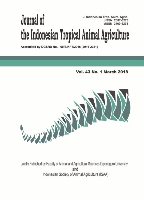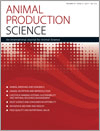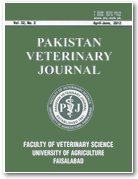
Frontiers in Animal Science
Scope & Guideline
Innovating research to enhance animal welfare and biology.
Introduction
Aims and Scopes
- Animal Health and Disease Management:
Research related to the prevention, diagnosis, and treatment of diseases in livestock and companion animals, including studies on immunology, stress responses, and veterinary practices. - Animal Welfare and Ethical Considerations:
Exploration of animal welfare standards, ethical treatment, and humane practices in farming and animal husbandry, as well as consumer perceptions and societal implications. - Nutrition and Feed Efficiency:
Investigations into animal nutrition, dietary formulations, feed additives, and their impacts on growth performance, health, and product quality. - Sustainable Agricultural Practices:
Studies focusing on sustainable practices in animal husbandry, including environmental impacts, resource management, and the integration of technology in farming systems. - Behavioral and Physiological Responses:
Research examining animal behavior, stress responses, and physiological adaptations to environmental changes, management practices, and breeding. - Technological Innovations in Animal Science:
The application of advanced technologies such as machine learning, precision farming, and sensor technologies in monitoring and improving animal production and welfare.
Trending and Emerging
- Precision Livestock Farming (PLF):
The rise of PLF technologies, which utilize data analytics, sensors, and machine learning to monitor animal health and welfare, has gained significant attention, indicating a trend towards more individualized animal management. - One Health Approach:
An interdisciplinary focus on the connections between animal health, human health, and environmental sustainability is becoming increasingly prominent, reflecting a broader understanding of health as a holistic concept. - Sustainable Feeding Practices:
Research into alternative feed sources, including the use of by-products and novel ingredients, is trending, driven by the need for sustainable animal nutrition in response to environmental concerns. - Animal Welfare Innovations:
Studies exploring innovative welfare practices, including environmental enrichment and humane handling, are becoming more prevalent as consumer demand for ethically produced animal products increases. - Climate Change Impacts on Animal Production:
The effects of climate change on livestock health, productivity, and management strategies are receiving growing attention, reflecting an urgent need to address environmental challenges in the agricultural sector.
Declining or Waning
- Traditional Breeding Techniques:
Research focused on conventional breeding methods has become less prominent as genetic engineering and genomic selection gain traction, leading to a decline in studies emphasizing traditional approaches. - Generalized Animal Production Models:
There has been a noticeable reduction in generic studies on animal production systems without specific focus on innovations or sustainability, as more targeted research emerges. - Static Welfare Assessments:
Static assessments of animal welfare that do not incorporate dynamic environmental or behavioral factors are receiving less attention, as the field moves towards more holistic and integrative welfare evaluations.
Similar Journals

Journal of the Indonesian Tropical Animal Agriculture
Connecting Academia and Practice in Veterinary ScienceJournal of the Indonesian Tropical Animal Agriculture is an esteemed peer-reviewed journal published by UNIV DIPONEGORO, focusing on the dynamic fields of animal science and veterinary medicine. Since its inception in 2009, the journal has maintained an open access policy, ensuring that valuable research is freely available to the global scientific community. Based in Indonesia, the journal has adapted to the evolving agricultural landscape and now contributes significantly to both local and international discourse on tropical animal husbandry. With a Scopus rank placing it within the 36th percentile for general veterinary sciences and the 25th percentile for animal science and zoology, it is emerging as a valuable resource for researchers and professionals alike. The journal covers a broad range of topics within its scope, fostering innovative approaches and solutions tailored to the unique challenges of the tropical environment. By exploring critical issues in animal agriculture, this journal not only enhances academic knowledge but also supports sustainable practices within the industry. We invite researchers, students, and professionals in the realm of veterinary science and animal agriculture to engage with the rich array of research presented in this journal.

Animal Production Science
Exploring the Future of Animal Science and Food ProductionAnimal Production Science, published by CSIRO PUBLISHING, is a prestigious journal that caters to the fields of Animal Science and Food Science. With an ISSN of 1836-0939 and an E-ISSN of 1836-5787, the journal features high-quality research and reviews that are crucial for advancing the understanding and innovation of animal production systems. Recognized within the Q2 category of both Animal Science and Zoology, and Food Science, as per the 2023 Journal Rankings, Animal Production Science has achieved commendable Scopus rankings, placing it in the 68th and 48th percentiles in its respective categories. With converged years from 2009 to 2024, and an aim to disseminate knowledge that promotes sustainable practices, the journal is pivotal for researchers, professionals, and students devoted to animal production and food security. Exploring topics from livestock management to food quality, the journal offers valuable insights for enhancing productivity while considering welfare and environmental impact. For those seeking accessibility, the journal provides various open access options, encouraging a wider reach of its scholarly articles.

CANADIAN JOURNAL OF ANIMAL SCIENCE
Cultivating Knowledge for a Sustainable Animal IndustryCanadian Journal of Animal Science, published by Canadian Science Publishing, stands as a pivotal platform in the fields of Animal Science and Zoology, reflecting its commitment to advancing knowledge and research in these crucial areas. Operating since 1975, with dedicated publication since 1993, this journal boasts an impactful history and has established itself within the academic community, holding a 2023 Q2 category rank in Animal Science and Zoology, and a Q3 rank in Food Animals. With its ISSN 0008-3984 and E-ISSN 1918-1825, the journal is accessible to a wide audience, promoting collaboration and the dissemination of innovation across borders. Although not an open-access journal, its valuable insights and research findings serve as essential resources for researchers, professionals, and students striving to enhance their understanding of animal science, veterinary studies, and agricultural practices. As the field of animal science continues to evolve, the Canadian Journal of Animal Science remains a vibrant and influential part of this dynamic landscape.

PAKISTAN VETERINARY JOURNAL
Leading the way in veterinary research and innovation.Pakistan Veterinary Journal (ISSN: 0253-8318, E-ISSN: 2074-7764) is a leading peer-reviewed academic journal published by the University of Agriculture, Faculty of Veterinary Science, situated in Faisalabad, Pakistan. Since its inception, the journal has embraced an Open Access policy, facilitating the dissemination of vital research findings to a global audience and enhancing the visibility of veterinary science. With an impressive Q1 ranking in the veterinary miscellaneous category, the journal ranks #27 out of 194 in the veterinary general field according to Scopus, placing it in the top 14% of the discipline. The scope of the journal encompasses a wide array of topics relevant to veterinary medicine, ensuring that it serves as an essential resource for researchers, professionals, and students alike. By providing a platform for high-quality research from 2009 to 2024, the Pakistan Veterinary Journal continues to play a pivotal role in advancing veterinary science, promoting collaboration among scholars, and addressing contemporary challenges in animal health and welfare.

REVISTA CIENTIFICA-FACULTAD DE CIENCIAS VETERINARIAS
Empowering research in animal and food sciences.REVISTA CIENTIFICA-FACULTAD DE CIENCIAS VETERINARIAS, published by the Universidad del Zulia, is a prominent open-access journal dedicated to advancing the fields of veterinary science, animal science, and food science. Since its inception in 1997, the journal has served as a vital platform for disseminating quality research and fostering academic dialogue among professionals and scholars in the veterinary and agricultural sectors. With its commitment to open access since 2010, the journal aims to make valuable research freely accessible to a global audience, thereby contributing to the advancement of scientific knowledge. Although currently categorized in the bottom quartile of various fields—including Animal Science and Zoology, Food Science, and Immunology—REVISTA CIENTIFICA-FACULTAD DE CIENCIAS VETERINARIAS is dedicated to nurturing innovative research that addresses pressing challenges in veterinary and related sciences. Researchers, professionals, and students will find this journal to be an important resource for quality studies that have implications for animal health, food safety, and biotechnology in the context of Venezuelan and international landscapes.

Abanico Veterinario
Connecting Researchers and Practitioners in Veterinary ScienceAbanico Veterinario is a prominent academic journal dedicated to the field of veterinary science, published by Sergio Martinez Gonzalez. With its ISSN 2007-4204 and E-ISSN 2448-6132, this journal serves as a vital resource for researchers, practitioners, and students interested in the latest advancements and research in veterinary medicine. Although Abanico Veterinario operates on a non-open access model, it provides insightful content that addresses a diverse range of topics such as animal health, veterinary ethics, and innovative practices. The journal aims to promote knowledge sharing and foster collaboration within the veterinary community, ultimately contributing to improved animal care and welfare. With a commitment to excellence and a growing reputation within the field, Abanico Veterinario stands as an essential platform for those seeking to enhance their professional skills and stay abreast of emerging trends in veterinary science.

IRISH VETERINARY JOURNAL
Pioneering advancements in animal health and welfare.IRISH VETERINARY JOURNAL is a premier open-access publication in the field of veterinary science, established to disseminate high-quality research and innovations that advance the veterinary profession and animal health. Published by BMC since 2004, this journal not only ensures worldwide access to cutting-edge findings but also maintains an impressive ranking as Q1 in the Veterinary (miscellaneous) category according to the 2023 metrics, highlighting its significance and influence. With an impressive Scopus rank of #19/194 and a 90th percentile placement, it provides a robust platform for researchers, professionals, and students alike to engage with the latest studies, reviews, and case reports. The journal's coverage spans from its inception in 1973 to the present, catering to a diverse audience interested in various aspects of veterinary science, ensuring that it remains an essential resource for those passionate about the welfare of animals and the advancement of veterinary practices.

Translational Animal Science
Fostering Knowledge Exchange in Animal ResearchTranslational Animal Science, published by Oxford University Press Inc, stands as a prominent journal in the fields of Animal Science and Zoology as well as Veterinary Sciences, achieving a commendable Q2 ranking in both categories for 2023. With an E-ISSN of 2573-2102 and transitioning to an Open Access model since 2017, this journal fosters accessibility and dissemination of vital research that bridges the gap between basic animal science and its practical applications. The journal's significant impact factor, where it ranks in the 71st and 65th percentiles respectively for Veterinary and Agricultural and Biological Sciences disciplines, highlights its importance as a resource for emerging trends and innovations in animal research. With submissions accepted until 2024, Translational Animal Science not only contributes to advancing knowledge but also aims to engage a broad audience of researchers, professionals, and students dedicated to improving animal health and welfare. Based in India, the journal serves as an essential platform for the exchange of scientific ideas that facilitate progress within these vital fields.

INDIAN JOURNAL OF ANIMAL SCIENCES
Connecting professionals with cutting-edge insights in animal science.INDIAN JOURNAL OF ANIMAL SCIENCES, published by the Indian Council of Agricultural Research, is a vital resource for researchers and professionals in the fields of animal science and veterinary studies. With its ISSN 0367-8318, the journal has been in circulation since 1971, providing a platform for innovative research and scholarly discourse. Despite its current Q4 ranking in Animal Science and Zoology and a Q3 ranking in Veterinary (miscellaneous), the journal aims to enhance its impact by promoting high-quality research that addresses the challenges in animal husbandry and veterinary practices in India and beyond. The journal does not operate under an Open Access model, which may limit certain dissemination opportunities; however, it remains indexed in Scopus, with a focus on elevating the standards of animal sciences. The INDIAN JOURNAL OF ANIMAL SCIENCES is pertinent for anyone looking to contribute to or stay informed about significant developments in animal sciences.

TROPICAL ANIMAL HEALTH AND PRODUCTION
Empowering professionals with cutting-edge research in animal production.Tropical Animal Health and Production is a prominent academic journal dedicated to advancing the field of animal health and production in tropical environments. Published by Springer, this journal has been a pivotal platform for researchers and professionals since its inception in 1969, serving as a vital resource for innovative studies and advancements up to 2024. With impactful research findings, it holds a respectable Q2 ranking in both Animal Science and Zoology, and Food Animals, demonstrating its significance within these fields. The journal’s commitment to high-quality research is further reflected in its Scopus rankings, with a notable position in Agricultural and Biological Sciences and Veterinary Food Animals. Although it is not an open-access publication, the insights and knowledge shared within its pages are invaluable for those engaged in tackling the challenges of animal health and production in the tropics. Researchers and students will find Tropical Animal Health and Production an essential source for the most recent advancements and practices in veterinary science and animal care for food-producing species.